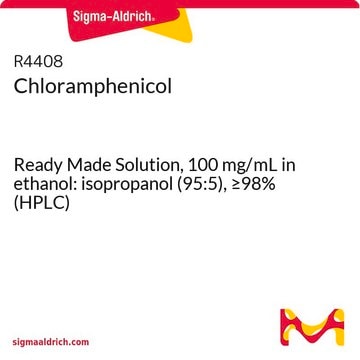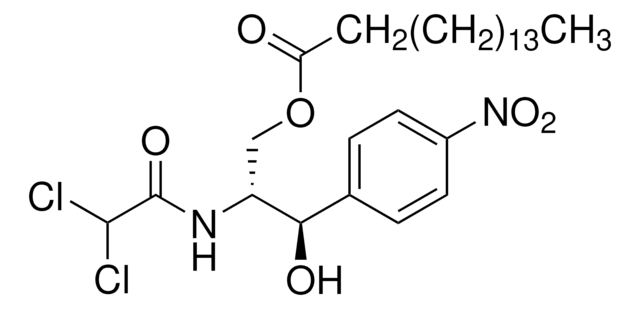BP854
Chloramphenicol
British Pharmacopoeia (BP) Reference Standard
Synonym(s):
D-(−)-threo-2,2-Dichloro-N-[β-hydroxy-α-(hydroxymethyl)-β-(4-nitrophenyl)ethyl]acetamide, D-(−)-threo-2-Dichloroacetamido-1-(4-nitrophenyl)-1,3-propanediol, D-threo-2,2-Dichloro-N-[β-hydroxy-α-(hydroxymethyl)-4-nitrophenethyl]acetamide, Chloromycetin
About This Item
Recommended Products
grade
pharmaceutical primary standard
API family
chloramphenicol
form
powder
shelf life
limited shelf life, expiry date on the label
manufacturer/tradename
BP
mp
149-153 °C (lit.)
application(s)
pharmaceutical
pharmaceutical small molecule
format
neat
storage temp.
2-8°C
SMILES string
OC[C@@H](NC(=O)C(Cl)Cl)[C@H](O)c1ccc(cc1)[N+]([O-])=O
InChI
1S/C11H12Cl2N2O5/c12-10(13)11(18)14-8(5-16)9(17)6-1-3-7(4-2-6)15(19)20/h1-4,8-10,16-17H,5H2,(H,14,18)/t8-,9-/m1/s1
InChI key
WIIZWVCIJKGZOK-RKDXNWHRSA-N
Looking for similar products? Visit Product Comparison Guide
General description
Application
Also used in monographs such as:
Biochem/physiol Actions
Mode of Resistance: Use of chloramphenicol acetyltransferase will acetylate the product and inactivate it.
Antimicrobial Spectrum: This is a broad spectrum antibiotic against gram-positive and gram-negative bacteria, and is used mainly for ophthalmic and veterinary purposes.
Packaging
Other Notes
related product
Signal Word
Danger
Hazard Statements
Precautionary Statements
Hazard Classifications
Carc. 2 - Eye Dam. 1 - Repr. 2
Storage Class Code
11 - Combustible Solids
WGK
WGK 3
Choose from one of the most recent versions:
Certificates of Analysis (COA)
Sorry, we don't have COAs for this product available online at this time.
If you need assistance, please contact Customer Support.
Already Own This Product?
Find documentation for the products that you have recently purchased in the Document Library.
Customers Also Viewed
Our team of scientists has experience in all areas of research including Life Science, Material Science, Chemical Synthesis, Chromatography, Analytical and many others.
Contact Technical Service








